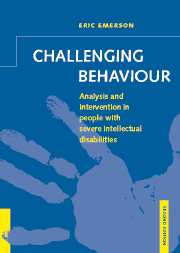7 - Behavioural approache
Published online by Cambridge University Press: 14 August 2009
Summary
In this chapter, a range of behavioural approaches to reducing challenging behaviour will be examined. It is not the intention, however, to provide a comprehensive meta-analysis of this vast area. Instead, attention will be directed to those approaches which form important components of the emerging technology of positive behavioural support (Carr et al., 1999a; Koegel et al., 1996a).
Those who are looking for more comprehensive or detailed reviews of specific areas are referred to the plethora of publications relating to this topic which has appeared over the last decade (e.g. Ball & Bush, 2000; Bouras, 1999; Carr et al., 1990b; Carr et al., 1999a; Cataldo, 1991; Cipani & Spooner, 1997; Didden, Duker & Korzilius, 1997; Emerson, 1998; Kiernan, 1993; Koegel et al., 1996a; Konarski et al., 1992; Lehr & Brown, 1996; Luiselli & Cameron, 1998; Luiselli, Matson & Singh, 1992; Matson et al., 1996; McGill, Clare & Murphy, 1996; Murphy, 1996; Oliver, 1995; Reichle & Wacker, 1993; Repp & Singh, 1990; Schlosser & Goetze, 1992; Schroeder, 1991; Schroeder, Rojahn & Oldenquist, 1991; Scotti et al., 1991b; Singh, 1997).
The contents of the chapter have been organized in terms of the general rationale behind particular approaches to intervention. Thus, approaches will be discussed which are based on: manipulating antecedent stimuli or changing the context to prevent the occurrence of challenging behaviour; behavioural competition or response covariation; disruption of maintaining contingencies; and punishment or other default technologies. In practice, of course, intervention programmes are likely to consist of a number of distinct approaches.
Information
- Type
- Chapter
- Information
- Challenging BehaviourAnalysis and Intervention in People with Severe Intellectual Disabilities, pp. 102 - 134Publisher: Cambridge University PressPrint publication year: 2001
